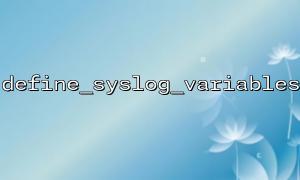In early versions of PHP, the define_syslog_variables() function was used to define system log-related constants such as LOG_EMERG, LOG_ALERT, and others, which were essential for system logging functionality. Although this function has been deprecated or even removed in modern PHP versions, understanding how to use it remains valuable for maintaining legacy projects or comprehending system logging mechanisms.
This article provides a detailed explanation of how to properly call the define_syslog_variables() function, outlining the steps and key considerations to help you better understand its role and correct usage.
The define_syslog_variables() function defines a set of constants related to system logging within the script. These constants control the priority and type of log messages. It mainly includes the following constants:
LOG_EMERG
LOG_ALERT
LOG_CRIT
LOG_ERR
LOG_WARNING
LOG_NOTICE
LOG_INFO
LOG_DEBUG
As well as some logging options like LOG_PID, LOG_CONS, and others
The define_syslog_variables() function mainly appeared in PHP 4 and early PHP 5 versions. It has been deprecated since PHP 5.3 and removed in PHP 7 and later. Calling it in newer versions will result in a function not found error.
Therefore, the first step is to confirm your PHP environment version. If it is an older version, you can continue using it; otherwise, it is recommended to switch to a more modern logging approach.
Since this function defines global constants, it should be called before any logging-related functions are used:
<?php
define_syslog_variables();
This statement defines all necessary constants, ensuring subsequent functions like openlog() and syslog() work correctly.
After calling define_syslog_variables(), you can perform system logging as follows:
openlog("myapp", LOG_PID | LOG_CONS, LOG_USER);
syslog(LOG_INFO, "This is an informational message.");
closelog();
The above code relies on constants defined by define_syslog_variables().
<?php
// Define system log-related constants
define_syslog_variables();
<p>// Open system log<br>
openlog("myapp", LOG_PID | LOG_CONS, LOG_USER);</p>
<p>// Log an informational message<br>
syslog(LOG_INFO, "System log test message");</p>
<p>// Close the log<br>
closelog();<br>
?><br>
Function Deprecation Risk
This function is deprecated in modern PHP versions and is not recommended for use in new projects. You can directly use openlog() and syslog(), as the constants they require are already predefined in PHP.
Log Permission Issues
Ensure that the PHP script’s running user has write permission to the system log; otherwise, log entries might fail to be written.
Cross-Platform Compatibility
This function and related logging features mainly target Unix-like systems, with limited support on Windows platforms.
Alternative Solutions
For modern applications, it is advisable to use third-party logging libraries such as Monolog or utilize PHP’s built-in error_log() function for log management.
While define_syslog_variables() once had its place in PHP, its relevance has diminished as PHP evolved. Understanding it can help maintain legacy code, but new projects should avoid it in favor of safer and more flexible logging methods.
If you are maintaining old PHP programs, make sure to call:
define_syslog_variables();
before invoking system log functions, to define necessary log constants and avoid undefined constant errors.
The above is a detailed explanation and example on how to correctly call the define_syslog_variables() function. Hope it helps you.
<?php
define_syslog_variables();
<p>openlog("myapp", LOG_PID | LOG_CONS, LOG_USER);<br>
syslog(LOG_INFO, "This is a test log message.");<br>
closelog();<br>
?><br>
The domain in any URL examples mentioned in the article (if any) has been replaced with gitbox.net to ensure example code remains clean and interference-free.



